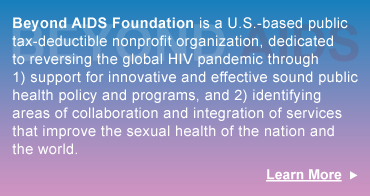|
OPINION |
Crisis or Politics?
Is Confidentiality Worth the Sacrifice of Thousands of Lives?|
AIDS still isn't perceived as a public health crisis, nor is it marketed as one. It's just one more political issue mired in debate between warring factions seeking solutions that are less time consuming, costly and likely to offend, and--as recently exemplified in California--liable to rise and fall at the whim of the political process. Last September, California's Pete Wilson vetoed an HlV-surveillance system on the grounds that it would be ineffective because it required tracking by alphanumeric code instead of individuals' names, claiming that approach would frustrate health officials' efforts to notify sexual and needle-sharing partners. The bill had represented a year-long compromise between the California Medical Association and a forty-member coalition of AIDS organizations. The bill was very much the product of politics. California and New York collectively account for one-third of AIDS cases. California AIDS activists, especially, have affected the education which contained the spread of the disease. But they have often put confidentiality before issues of overall public health. Many argued in favor of neither reporting nor tracing, in spite of the speed with which the disease spreads when knowledge is withheld. On the other hand, the medical lobby sought to treat HIV as any other communicable disease: report contacts by name as well as tracing their sex or drug partners, without concern for confidentiality. The vetoed bill was a compromise between the two camps, but was rudely defeated before it had a chance to work. Last June, New York required reporting of positive HIV test results as well as contact tracing, leaving California the major holdout in HlV-reporting. Thirty-one states have surveillance reporting systems, all but two name-based (the coded system proved a failure in Texas). The AIDS crisis has been marked by a lack of coordinated efforts on all fronts: research, prevention, and intervention. |
And everywhere the politics of the crisis takes center stage, while the lives of those without a voice are sacrificed in the name of civil rights. Since efficient and effective tracing of the virus constitutes a significant factor in its containment, reason would dictate that this would be the point at which politics would yield to efficacy. Further, concerns around the misuse of people's HIV/AIDS status have been part of the reason why health departments have not taken the next logical step in gaining control of this infectious disease, contact tracing: those exposed encouraged to be tested in order to slow the spread. However, since contact tracing makes confidential information public, a delicate balance between con- fidentiality and public health has become the guiding principal. Critics argue that in the two largest states, privacy concerns remain important for gay men and illegal immigrants where the assumption persists that mandatory partner notification will scare people away from testing. But it should be pointed out that accurate and effective tracing by name does not obviate anonymous testing. Even the CDC encourages that anonymous testing continue to be available for those not ready to confront their circumstances and most states continue to offer it. Plus, the playing field has been leveled in the areas of discrimination --which is at the core of the privacy concerns--by the recent Supreme Court decision granting protection under the Americans With Disabilities Act. That being a hard-won battle, isn't it time now to put our house in order to stop the spread of HIV by marketing it as a health issue, and model it as such? President Clinton announced in October that $I56 million in federal funding was to be allocated to combat the epidemic among blacks and Latinos. The monies are being targeted to develop new strategies because the old ones simply aren't reaching these populations. And issues of confidentiality are not the core concerns of those spreading the virus--ignorance and denial are. |
Underlying both federal and state confidentiality schemes is the medical profession's tradition of physician confidentiality, developed from the Hippocratic oath, stressing trust between patient and doctor. The Privacy Act of I974 mandates that no agencies shall disclose any records without compelling circumstances. And any assessment of the constitutionality of a testing and reporting program must begin with a determination of the purpose of the problem and that no less drastic alternatives remain. So aren't we already there? Public health is one of the few areas of policy-making where the protection of the group is valued above protection of individuals' rights in making decisions about private health information. Mandatory vaccination of school-aged children is carried out with disregard to parents' wishes as prevention of infectious childhood disease and epidermis are deemed to take precedence, while reporting of STDs has been a practice of long standing. The distinctions implicated in HIV can be debated indefinitely, but the fact remains that in a single year the CDC reported that new AIDS cases among heterosexual black women increased 12% while among pediatric AIDS patients, 4,600 were African-American compared to 1,400 European-American children. So...isn't it obvious that we no longer face a crisis affecting only the gay community with a continued need to keep statuses hidden? Isn't it time to either model solutions aimed at solving the health crisis or at least one addressing a different demographic? Guided by the latter we would go a long way toward healing the health crisis; guided by the former we would take a giant leap in the interests of unity and humanity. •
Liz Parks, lettered in philosophy and the law, works as a freelance writer and researcher in the law and in private industry. |
|
DECEMBER 1998 • A & U |
![]() Return to Archived Articles and Letters
Return to Archived Articles and Letters

